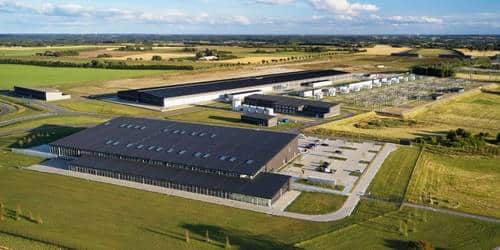Data centers are rapidly becoming an essential part of modern businesses. To ensure smooth operations, choosing the right data center company that can offer reliable and secure services in Australia is important.
Before engaging a data center provider, there are various things you need to consider, such as pricing models, scalability options, technology options, and security measures. This article outlines the key elements before engaging a data center company in Australia.
1. Connectivity of the Data Centre
Connectivity is another important factor to consider when selecting a data center provider. Businesses must ensure that the data center has sufficient internet speeds and bandwidth to meet their connectivity needs. They should also confirm if the data center provides fiber optics, dedicated circuits, or leased lines for increased speed and reliability.
The data center should also offer multiple connection points to ensure that data is sent and received without disruption. Additionally, businesses should look for a data center provider that offers disaster recovery services in case of power outages or other issues that can affect the data center infrastructure.
2. The Power Supply
Power supply is an important factor to consider when selecting a data center provider. Data centers should provide enough power to allow businesses to run their applications and services without experiencing any downtime or lag. Businesses need to ensure that the data center’s power supply meets their specific requirements and has redundancy measures in place in case one of the sources fails.
3. Consider Any Certifications
It is important to consider any certifications the data center provider may have. The certifications will assure that the data center meets a certain level of compliance with Australian and international standards such as ISO 27001, SOC2 and PCI DSS.
These standards ensure that the data centre has implemented security measures to protect businesses’ confidential information. Certifications assure that the data centre provider can also handle any potential security threats.
Certified compliant data centres from Macquarie Data Centres will give your business peace of mind and ensure that you have the highest standard of data centre infrastructure.
4. Reliability, Quality of Service, and Security
Reliability, quality of service and security are important factors to consider when selecting a data centre provider. Businesses need to ensure that the data centre has reliable 24/7 uptime, support, and quality of service (QoS) measures. The QoS measures should include regular monitoring of server performance, ensuring backups are taken regularly, and responding to any issues quickly.
Businesses also need to ensure that the data centre is secure and has measures to protect their confidential information. This can include physical security features such as CCTV and access control systems, as well as cyber security measures like firewalls, antivirus protection, encryption and regular audits. Additionally, the data centre provider should have a detailed disaster recovery plan to ensure business continuity in case of unforeseen events.
5. Understanding Your Exact Requirements
The first step businesses should take before engaging a data centre provider is to understand their exact requirements. This includes understanding their current and future data storage needs, the type of applications they plan to run on the server, and how much processing power or memory will be required. Once businesses have established their exact requirements, they can look for the right data centre provider to meet them.
6. Type of Hosting You Need
The type of hosting you need is an important factor to consider when selecting a data centre provider. Different types of hosting are available such as dedicated servers, shared servers, cloud servers, and virtual private servers. Each type has its advantages and disadvantages depending on the needs of the business.
Dedicated servers offer organizations complete control over their server and all the associated resources, including storage, bandwidth, and more. This type of hosting is ideal for businesses that need a lot of control and customization of their server.
Shared servers offer an economical solution by sharing resources with other businesses on the same server. This type of hosting is best suited for smaller businesses that don’t need a lot of control and customization over the server.
7. Air Conditioning Capabilities
Air conditioning is an important factor to consider when selecting a data centre provider. The right air conditioning and cooling systems will help ensure that the server environment is adequately cooled to prevent overheating and damage. Businesses need to look for data centres with redundant cooling capabilities in the event of a system failure and monitor systems to ensure temperature levels are maintained correctly.
8. Additional Services
When selecting a data centre provider, businesses should look for providers that offer additional services to ensure they get the most out of their data centre. These services can include professional IT support and maintenance, managed hosting solutions, disaster recovery planning and more. Professional IT support will help businesses keep their server up-to-date with software updates, hardware repairs and more.
Managed hosting solutions can help businesses reduce the costs associated with running a data centre by allowing them to outsource certain tasks, such as server maintenance and security updates. Disaster recovery planning ensures that businesses have a plan in place for dealing with any unexpected issues that may occur.
Finally, some data centres offer colocation services, which allows businesses to have their server housed in the provider’s data centre. This can provide numerous benefits for businesses, including cost savings, improved performance and increased scalability. When selecting a data centre provider, it’s important to consider these additional services and determine if they are necessary for the business.
9. Adequate Bandwidth and Speed
Adequate bandwidth and speed are essential for businesses when selecting a data centre provider. The amount of bandwidth and the connection speed will determine how quickly data can be sent and received, which is important for maintaining high-performance levels. Businesses must ensure that their chosen data centre offers sufficient bandwidth and speed to meet their needs.
Additionally, businesses should ensure that the data centre offers multiple connections to reduce the risk of downtime. Multiple connections also ensure sufficient redundancy in case one connection fails, which is especially important for mission-critical applications.
Finally, businesses should check if their chosen data centre supports newer technologies such as high-speed Ethernet, fibre optics, and optical networks. These technologies offer much faster speeds and more reliable connections than traditional copper cabling, which can improve the performance of the data centre.
10. Investigate Green Initiatives
When selecting a data centre provider, businesses should investigate the green initiatives that the provider has in place. Data centres consume large amounts of energy, so it is important to ensure that the chosen provider has measures to reduce their carbon footprint.
These measures can include using renewable energy sources such as solar and wind power, implementing data centre virtualization technologies, and using more efficient cooling systems. Additionally, the provider should have a robust recycling program for any generated electronic waste.
Businesses should also look into the provider’s sustainability practices, such as reducing water consumption, using energy-efficient equipment, and utilizing green building techniques. By selecting a data centre provider with robust green initiatives, businesses can ensure that their data centre operations are helping to reduce the environmental impact of their business.
Conclusion
Selecting the right data centre provider is essential for businesses that want to ensure their IT systems are secure, reliable and cost-effective. When selecting a data centre provider, businesses must consider various factors such as location, security measures, additional services, etc.
Additionally, businesses should investigate the green initiatives that the provider has in place to ensure their data centre operations are helping reduce the environmental impact of their business.
Related Articles
- CALL CENTER SOLUTIONS: 19+ Cloud-Based Solutions for any Business (+ Reviews)
- 21 Best CALL CENTER PHONE SYSTEMS & Reviews in 2022 (Updated)
- MANAGING COST: 5 best keys for cost management
- Best Business to Start with 300k: All You Need (+ Business Plans & Free Tips)
- INNOVATION LEADERSHIP STYLES AND CHARACTERISTICS






